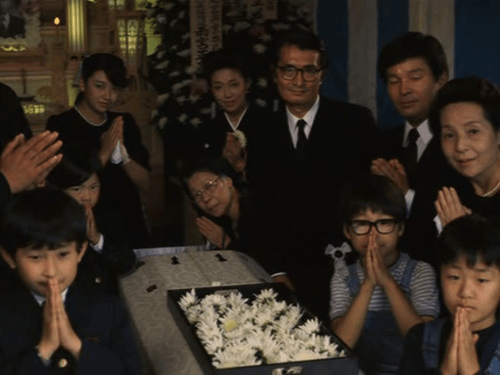
![]()
In what would be the beginning to his prolific career as one of Japan’s top auteurs, the late Juzo Itami brings this tale of chaos during a family funeral.
Family patriarch Shinkichi Amamiya has passed away after suffering a heart attack. Upon the request of his widow, the wake for the funeral is to be held in the home of her daughter, actress Chizuko Amamiya and her husband, actor Wabisuke Inoue. Inoue was never fond of his father-in-law so it comes to no surprise that Inoue is none too thrilled about having the wake at his home for the next three days.
Things only go from bad to worse. Having never experienced a funeral in their lives, Wabisuke and Chizuko resort to watching a video tape on how to perform rightfully at a funeral. As many of the Amamiya family members and friends arrive for the wake, things get chaotic. Some of the visitors include members who only wonder how much money he had because they want to get their hands on the family fortune, some old business associates who find themselves drinking their sorrows away, and a young female who claims to know the elder Amamiya through the game of gateball only to reveal she is there because she had been having an affair with Inoue and wants him to leave his wife for her. This is three days this family will have to endure.
Juzo Itami is quite an interesting filmmaker who tends to make subtle style comedies with a dose of “what the heck” moments that somehow work. Look at the review for Tampopo to see what exactly what we mean by this. His feature film debut as a writer and director seems a like a simplistic tale of a funeral and the various reactions by family and friends. However, for some reason, it works and can be seen as a precursor to the 2007 Frank Oz comedy Death at a Funeral, which was remade in 2010.
The film’s driving force is actually the couple whose house is the setting for the wake. Tsutomu Yamazaki and Itami’s wife, Nobuko Miyamoto, play the son-in-law and daughter of the deceased and they both have their own personalities. Inoue is not really arrogant, but somewhat of a grump at first because he never really liked his father-in-law and on top of that, he is having an affair in which the side piece does show up at the funeral in an attempt to take him away. This results in the two of them having a quick frolic in the forest with some comical results.
As for Chizuko, she is more subtle and doesn’t really know how to react perhaps due to her lack of ever being in a funeral. However, she proves to be close to her mother and brother and in a nice bonding scene, the three of them start drinking and singing to remember their beloved father and husband.Some of the other characters can be seen as eccentric, from the housemaidens who disapprove of the deceased’s business associates drinking their sorrows away late into the night and even making fun of them to the greedy relatives. Aside from the mother, it is clear that Chizuko’s brother Shokichi does care about his father and even denounces his uncle and cousins for only caring about how much money the deceased had because they think they can get their hands on some of the fortune.
The film also gives the viewer a look at Japanese funeral customs, something that proves to be quite unique and that’s something about Itami’s films. While his films are comedies geared towards Japanese audiences, he also attracts international audiences who want a sense of not only Japanese cinema, but in some aspect, Japanese customs and their differences.
The Funeral is a pretty subtle and comedic look at a Japanese funeral from the mind of one of the late great auteurs of cinema. With an eclectic cast and some bursts of laugh out loud moments, Juzo Itami truly made a worthy film debut.
WFG RATING: A
New Century Productions An Itami Productions film. Director: Juzo Itami. Producer: Seigo Hosogoe. Writer: Juzo Itami. Cinematography: Yonezo Maeda. Editing: Akira Suzuki.
Cast: Tsutomu Yamazaki, Nobuko Miyamoto, Kin Sugai, Hideko Otaki, Hiroko Futaba, Kiminobu Okumura, Koji Okoyama, Asao Sasano, Hideo Nagai, Atsuyoshi Matsukidaira, Chikako Yuri,
Michino Yokoyama.

